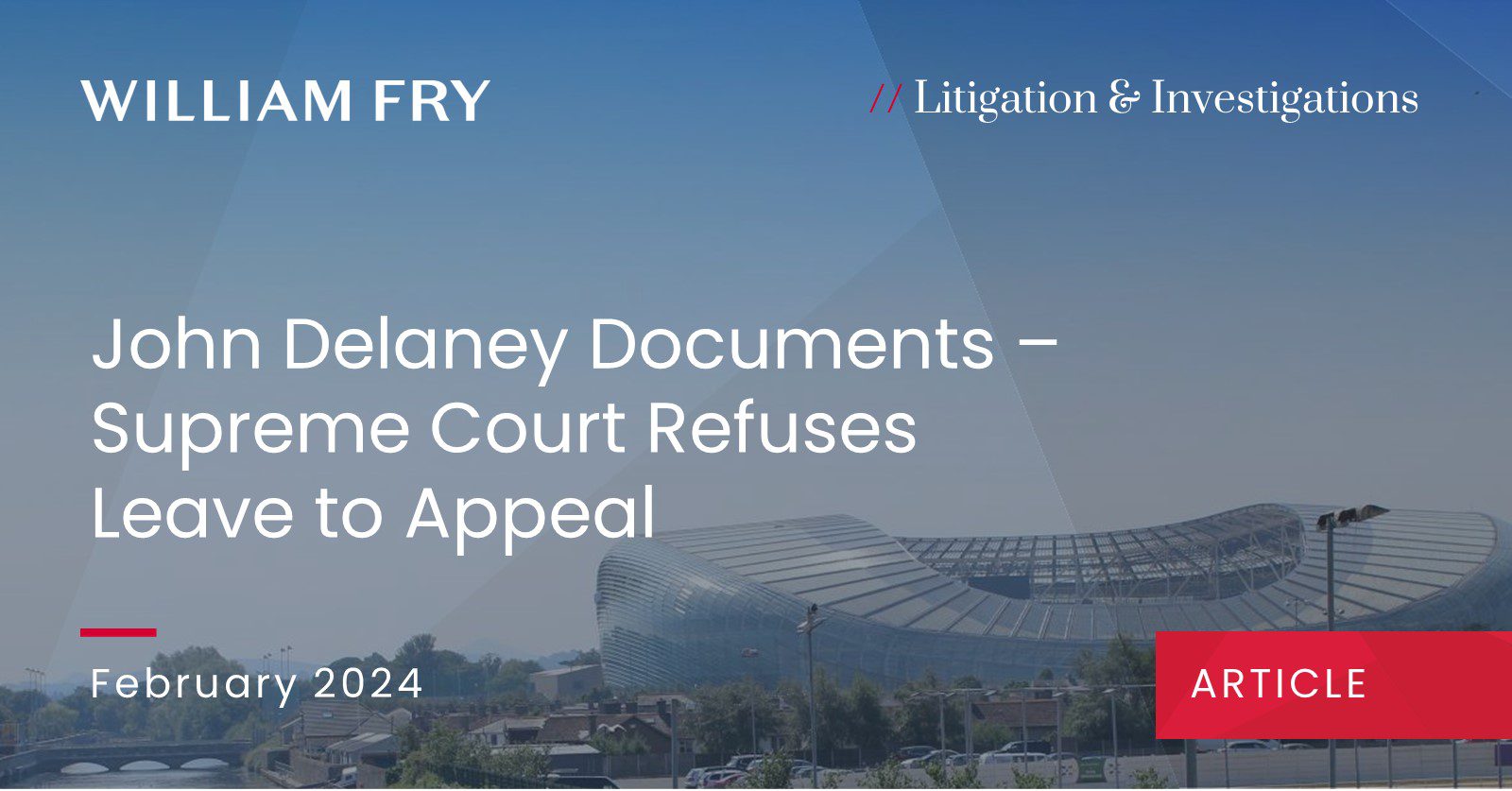The Supreme Court has refused to grant John Delaney leave to appeal the 2023 judgment of the Court of Appeal.
They dismissed his appeal against the 2022 determination of the High Court that Mr Delaney had failed to establish privilege in any of 1,123 documents seized by the Corporate Enforcement Authority (CEA) in 2020, as part of an investigation into the conduct of the affairs of the Football Association of Ireland (FAI).
Background
In October 2022, Ms Justice Reynolds in the High Court rejected John Delaney’s claim of privilege over numerous documents seized from the offices of the FAI by the CEA on foot of a search warrant, on the basis that he had failed to discharge the necessary burden of proof. As a result, the High Court ordered disclosure of more than 1,000 documents to the CEA. See our previous article discussing this decision here.
Mr Delaney appealed that decision to the Court of Appeal (COA). Dismissing Mr Delaney’s appeal, Mr Justice Noonan stated that it was difficult to avoid the conclusion that
Mr Delaney’s manifest failure to comply with the order of the court is not due to circumstances beyond his control but is rather a deliberate attempt to shield documents from disclosure which he does not wish to disclose.
See our previous article on the COA decision here.
Application for Leave to Appeal to the Supreme Court
Mr Delaney sought leave to appeal the judgment of the COA to the Supreme Court (Court).
The Court noted that as this was an appeal from a decision made in respect of whether certain documents are entitled to privilege, it was in the nature of an interlocutory or ancillary application. The Court acknowledged that it is rare that it would accept applications for leave to appeal in respect of interlocutory or ancillary matters unless the issue raised is of “real and general public importance, giving rise to substantive issues of law, which would justify the additional delay in this and in any related proceedings necessarily involved in permitting a further appeal to be brought to this Court.“
General Public Importance
Mr Delaney argued that the decision involved an issue of general public importance because of the novelty of the procedure for obtaining execution of a search warrant under the Companies Act 2014 (2014 Act), and the determination of issues relating to privilege. He also asserted that the case law is ambiguous around the question of whether or not privilege assessments, more generally, are to be conducted based on an actual assessment and review of the documents.
On this point, the Court held that whilst the specific procedure provided for in this case was novel, the issues relating to legal professional privilege were not unusual in inter partes civil proceedings. What was novel about the procedure under the 2014 Act, was that it provided for a situation where information can be seized but not inspected pending determination of contested issues of privilege by the High Court. However, the Court found that the procedure, in itself, did not raise any issue of complexity or general public importance.
Treatment of Statutory Assessor’s Report
As part of the process in determining whether the documents attracted privilege, two independent experts had been appointed under Section 795(6)(b) of the 2014 Act to prepare a report (Assessors’ Report) to assist the High Court in reaching a conclusion. Mr Delaney raised a fundamental issue of principle about the treatment of the statutory Assessors’ Report. He argued that there was no clarity as to:
- what status the report had in law;
- whether or not a judge was entitled or required to show deference to the findings of the assessors;
- whether the judge had to give reasons for rejecting the report’s findings;
- if so, what level of detail is required for those reasons;
- what regard is to be given to the fact that the assessors had seen the documents themselves and the trial judge had not; and
- more generally, the nature of the relationship between a court and an independent person(s) appointed under statute to undertake a specific function to assist the court.
On this argument, the Court found that the assessment of privilege was a matter for the trial judge. The Court accepted that the Assessors’ Report was important, and cannot lightly be disregarded by the trial judge, and where the court departs from the advice or recommendations in the report, it should give reasons for doing so. However, the Court rejected the argument that this raised any issue of general public importance.
Decision
Accordingly, the Court did not consider that it was in the interests of justice to grant leave to appeal. It found that granting leave would lead to a further hearing of arguments already fully ventilated in the High Court and COA, particularly with respect to interlocutory and ancillary matters.
Conclusion
This decision brings an end to the four-year battle which began following the CEA’s seizure of over 250,000 documents from the FAI’s office in 2020. The CEA is now set to progress the investigation into Mr Delaney and the FAI.
If you have any questions on legal professional privilege or any of the other issues raised in this case, please contact Deirdre O’Donovan or your usual William Fry contact.
Contributed by Kate Abell



